James Belushi and John Ritter Save the World in 1987's Ingratiatingly Insane Real Men
This movie is rather unusual
I dimly recall watching the 1987 comedy Real Men as a child and being impressed by its weirdness. I remembered almost nothing about it except for a pen and space aliens.
So it was surreal revisiting it thirty-six years later for my exhaustive exploration of the complete filmography of James Belushi and discovering that it is every bit as bizarre as I imagined it would be, if not more so.
If I can damn Real Men with faint praise it is far and away the best of the three espionage-based action comedies James Belushi made at the beginning of his career. The other two are the woeful The Man With One Red Shoe and Jumpin’ Jack Flash.
Real Men feels like a film out of time, an oddball excursion that would feel more at home in the kooky, swinging sixties or at the height of New Hollywood rather than at the end of the Reagan years.
Jim Belushi has one of his nuttiest and best roles in Nick Pirandello, a womanizer and wisecracker who also happens to be one of the best CIA agents in the world. Nick might not cut a particularly intimidating figure but he possesses a set of skills that the Central Intelligence Agency finds very useful.
In Real Men mankind has messed up but good by accidentally releasing chemicals into the ocean that promise to destroy our planet and wipe out humanity. Thankfully benevolent aliens have taken pity on us puny man-animals and offered humanity one of two options: we can either have a “Big Gun” capable of destroying a planet or a “Good Package” that will purify the ocean and prevent an apocalypse entirely of our own making.
The aliens understandably don’t trust what I will be the first to concede is a pretty iffy, sketchy species, all things considered. They only trust an agent nicknamed Pillbox (John Ritter) who dies during a practice run for the big, earth-saving handoff.
Thankfully Pillbox has an exact double in Bob Wilson (also John Ritter), an insurance agent who he is leading a life of quiet desperation as a milquetoast doormat so meek that he’s terrorized by the same neighborhood bullies (including future indie it boy James LeGros) who stole his son’s bike.
The CIA agent swoops dramatically into the put-upon insurance agent’s humdrum, sleepy life and immediately proceeds to turn it upside down.
If you listen to a lot of true crime podcasts, as I do, then you know that a lot of con men, cult leaders and other grifters like to tell people that they’re in the CIA. For Flim-Flam men claiming to be a CIA agent is a way of both impressing prospective partners with your glamorous, important and dangerous profession and preventing further questions or demands.
A CIA field agent’s life is secretive by definition. So if they jet off unexpectedly in the middle of the night and don’t communicate with you for weeks they can just say that they were on a secret mission and no one could know about it, not even the people closest to them.
Nick definitely seems like he could be an unusually cocky con artist trying to rope an innocent man into his weird hustles. He doesn’t seem to take anything seriously, including the fairly central role that he is looking to play in mankind’s ultimate salvation. To this man of action it’s just another day at the office.
Alternately Nick seems like he could be someone who just escaped from a psychiatric institution and very much believes that he works for the CIA even though he just escaped the loony bin.
Bob takes everything very seriously. Nick, in sharp contrast, takes nothing seriously. Everything to him is a joke and a laugh, including the many Russian agents shooting at them to prevent Bob from taking Pillbox’s place at the alien exchange.
Belushi’s performance embodies what critic Dave Kehr described as one of the primary forms of post-Saturday Night Live comedies: deadpan under-reaction to an increasingly surreal and fantastical string of events.
Russians are constantly trying to kill Nick but he barely seems to notice. James Belushi is pathologically nonchalant, a sarcasm machine in the vein of his older brother John, who was also an actor, interestingly enough, or Bill Murray.
Ritter is perfectly cast as an ordinary man who unexpectedly finds himself in a most extraordinary situation. We experience the movie and its wild, crazy action through his eyes, as a waking nightmare/dream that just gets loopier by the moment.
It’s never entirely clear why Bob goes along with Nick’s insanity although he is at least a little worried that he will shoot him if he tries to escape. Also, during the Cold War there was a weird understanding that the battle between righteous, holy capitalism and evil Communism was so important that every American had to do their part, at gunpoint if necessary.
In a running gag that epitomizes the movie’s joyous lunacy Bob inexplicably thinks that the aliens have given him the power to shoot real bullets out of his fingers so he’s always going “pew-pew, pew-pew!” In the Russians’s direction.
Then comes the ugliness.
I recently wrote a blog post about what I called “The Blackface Bomb.” That’s the unpleasant experience of enjoying a very old comedy and then being confronted with the hideous insidiousness of racism when, seemingly out of nowhere, a white character shows up in blackface.
Blackface thankfully was largely verboten by the 1970s but films from the 70s, 80s and 90s have their own surprise shame in what I’m going to call the Trans Bomb.
That’s when you’re enjoying a light-hearted lark like Real Men and then, boom, seemingly out of nowhere there’s an explosion of transphobia and trans panic.
When Bob meets Nick’s family a sexy older woman pounces upon him at the first opportunity and very aggressively makes out with the bewildered husband and father.
The joke, unfortunately but predictably, is that the hurricane of sexual aggression that was just unleashed on Bob, played by the woman who inhabited the title character in Ilsa: She Wolf of the SS, used to be James’ father before a rather dramatic and successful surgery changed all that.
Nick seems very understanding of his father’s transition, even enthusiastic, but he also refers to the woman of a certain age who groped Bob as “Dad” and “Him” and the humor of the scene comes from the palpable discomfort a heterosexual man experiences upon discovering that someone who just initiated sexual contact with him is not a cis woman.
Of all of the film’s free-floating wackiness that is the part that rings false and feels hopelessly dated. I’d like to think that that the days of movies using someone being trans as a cheap punchline are over but perhaps I’m giving us too much credit.
The movie, and Bob, eventually recovers in time for their big rendezvous with a spaceman from another planet.
Real Men is one of the strangest movies any studio released in the 1980s. Watching the film I found myself wondering how a script this crazy and defiantly non-commercial was green-lit and then made by a major studio and not as some manner of tax dodge.
Ritter grows increasingly macho as things progress. Saving the world alongside the world’s greatest secret agent brings out the aggressive alpha male in him but I prefer Ritter when he’s confused and overwhelmed.
In the “Reception” section of Real Men’s Wikipedia page it adorably asserts, “Upon release, the film received mediocre to poor reviews. In particular, the plot was panned as not credible.
I love the idea that grumpy film critics at the time watched a movie involving magical pens from outer space, and space aliens who seemingly want to give us all of the secrets of the universe in exchange for a single glass of water and were chagrined that it wasn’t realistic.
The plot to Real Men is extremely not credible. That’s one of the many things I dig about it.


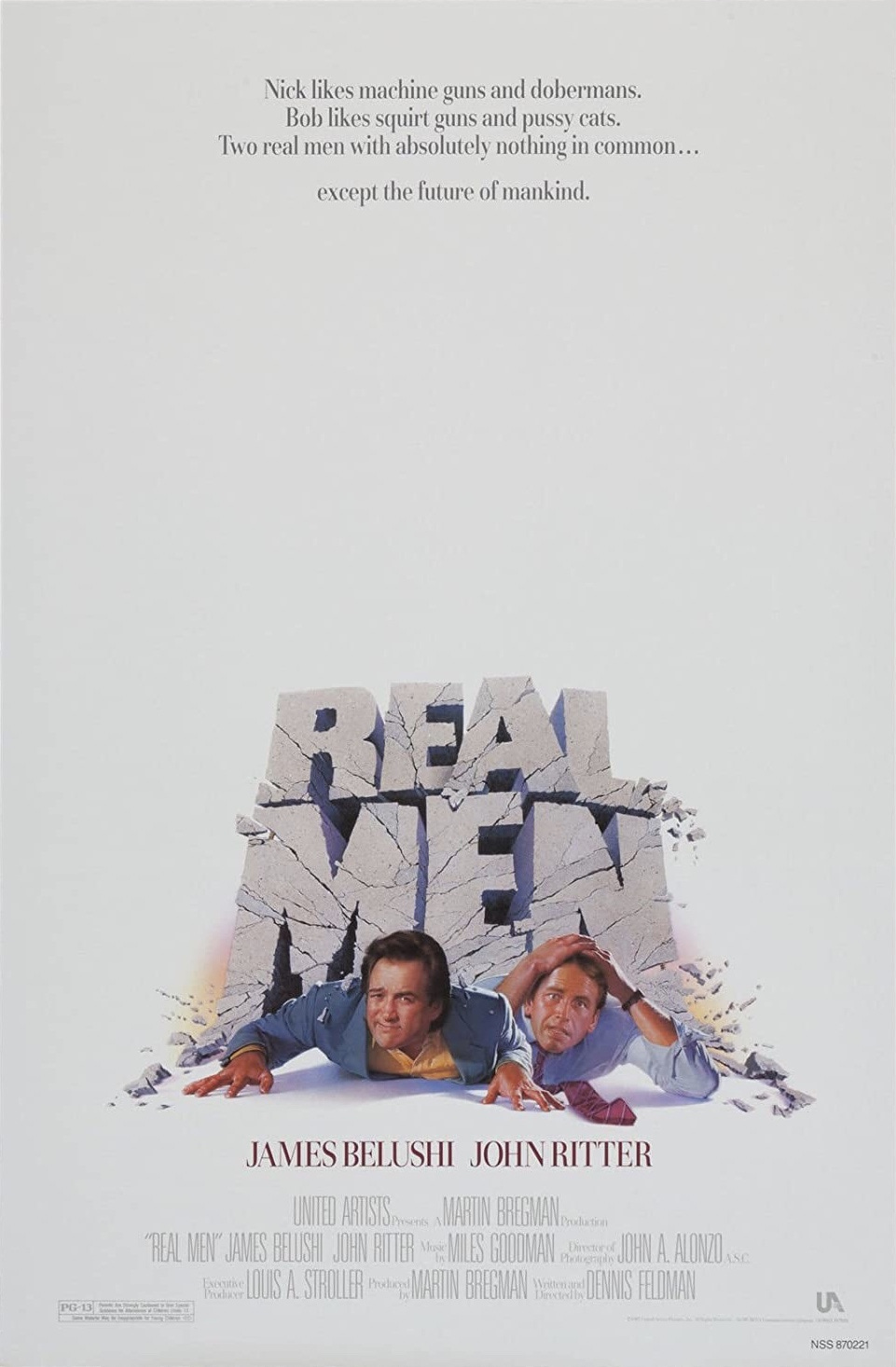
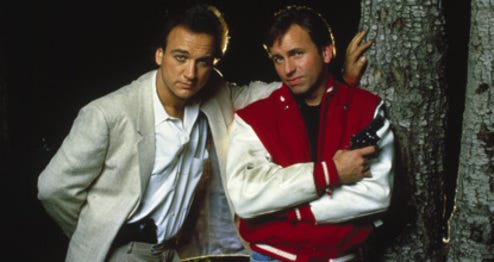

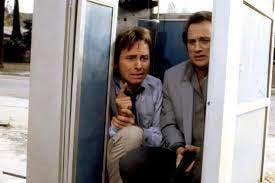
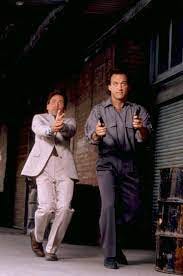
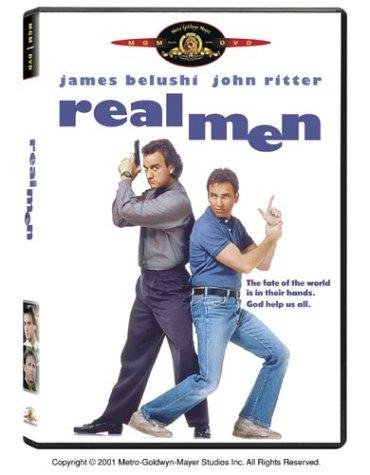
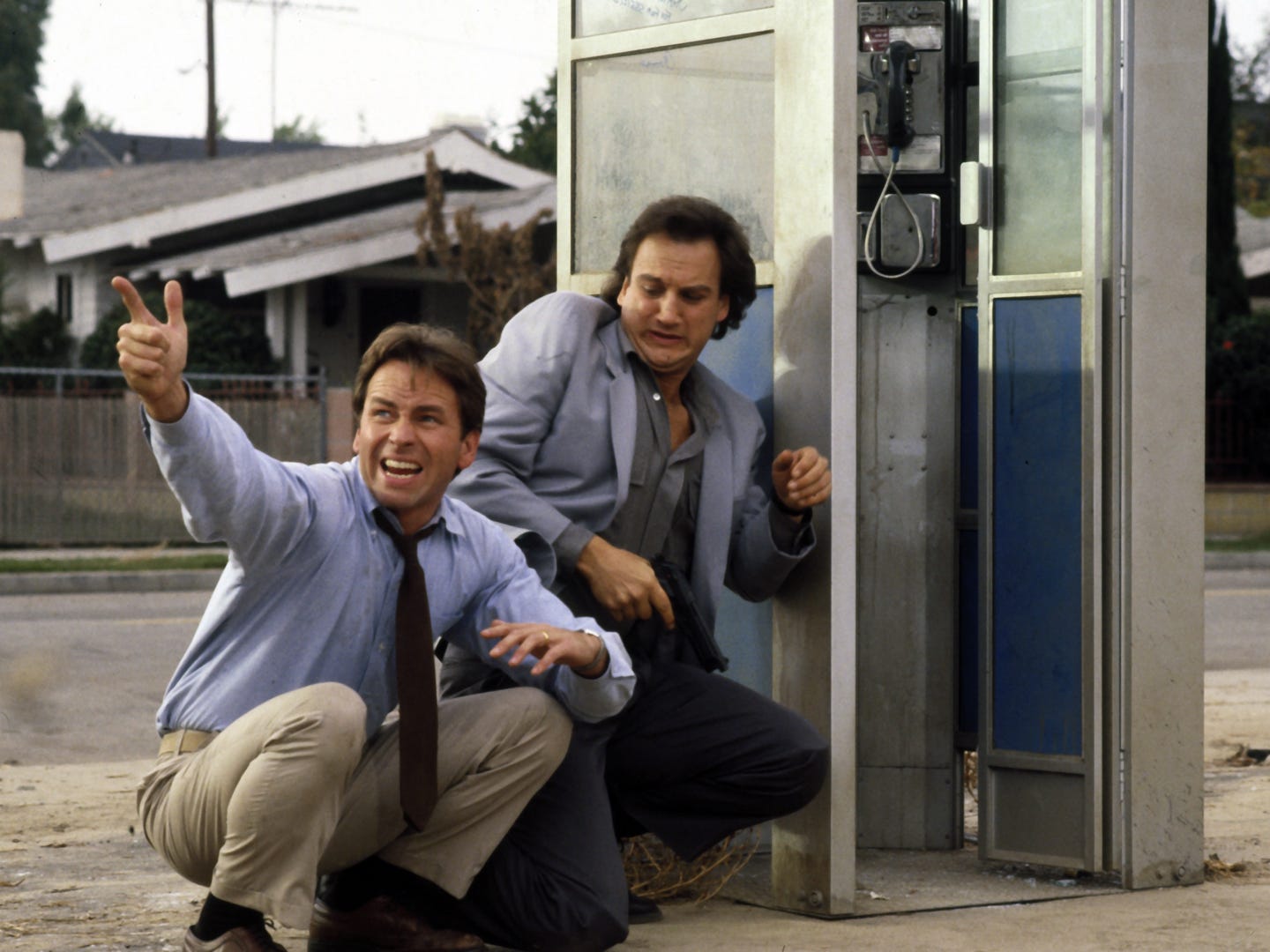
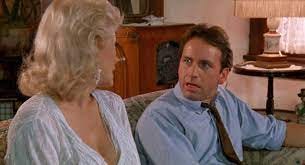
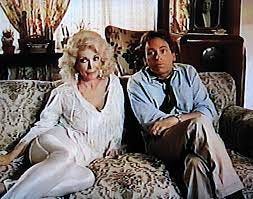
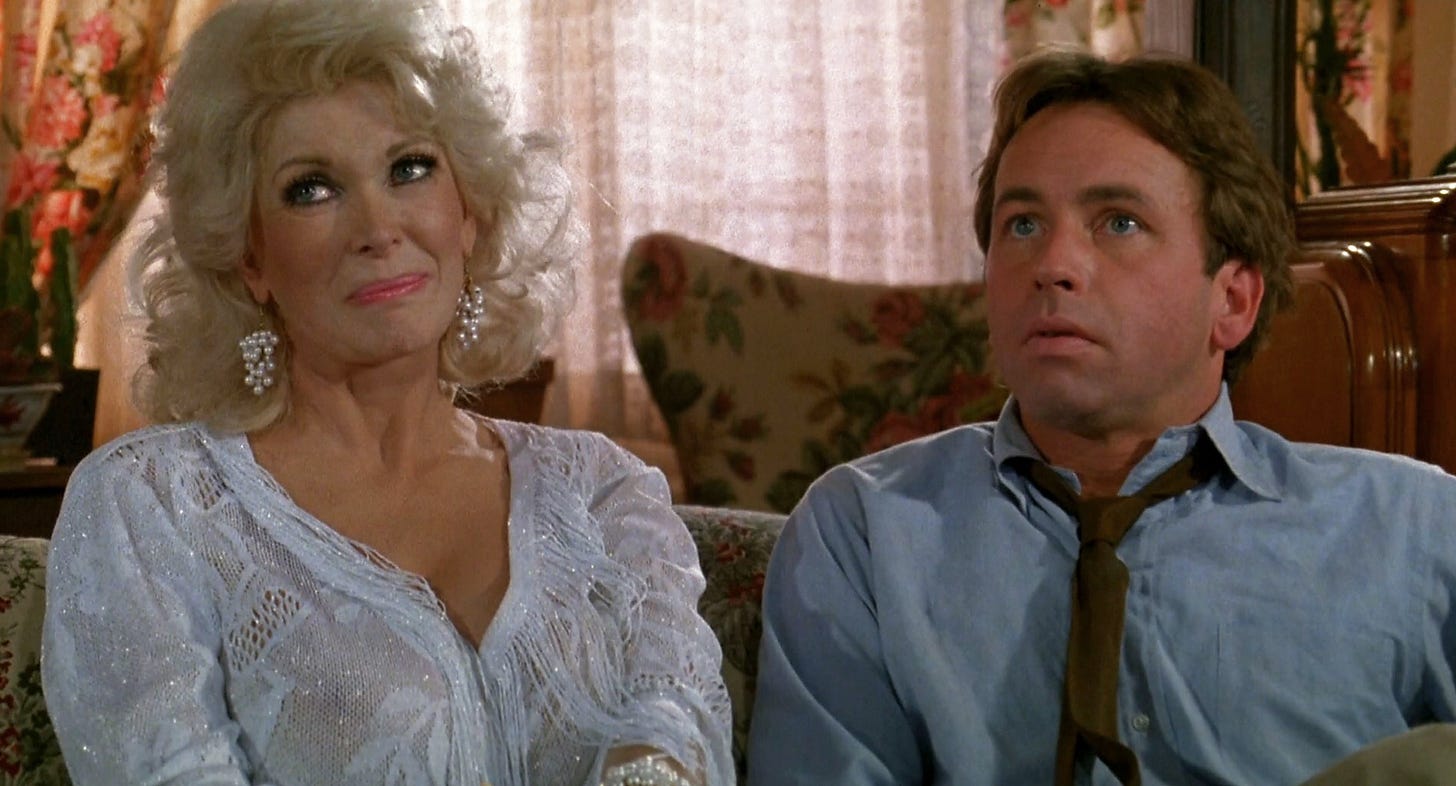
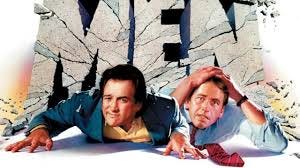
John Ritter would have an Oscar on his shelf had he lived. I will die on that hill. "Sling Blade," in which I didn't recognize him for much of the film, showed he could do drama.
Which doesn't surprise me that much, because comedy is actually *much* harder than drama. As PJ O'Rourke once wrote, anyone can get on stage and I say "I have cancer" and win over the crowd, but how many people can go up there and be a stand-up comic for five minutes?
Curiously, most of Jim Belushi's comedies were panned (though he's actually quite good in this film) but some of his dramatic performances like "Salvador" and "The Ghost Writer" earned him solid reviews. I wonder what might have been had he'd gone in that direction instead of trying to copy his late brother.
I was very excited to see that you had written about this one because I thought I was the only person on Earth who remembered it. And fondly I might add. My favorite scene might be when the Russians have our heroes cornered and then immediately stop shooting because it's lunchtime. Definitely very credible.